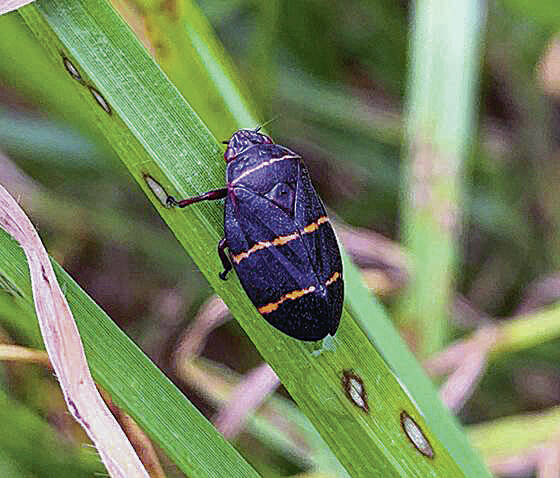State measure to help combat invasive insect introduced
KAILUA-KONA, Hawai‘i — The state House of Representatives Committee on Finance took up a measure on Thursday to fund mitigation and control of the two-lined spittlebug, an invasive pest that has destroyed thousands of acres of pasture land on Hawai‘i Island.
The two-lined spittlebug is an invasive insect that destroys key forage grasses used by the livestock ranching industry. In 2016, the state’s first two-lined spittlebug infestation was discovered in Kealakekua, where the pest ravaged nearly 2,000 acres of pastureland.
Grasses damaged by two-lined spittlebug infestations are often unsalvageable and must be replanted. Pastures do not recover after infestation but instead are replaced by invasive plants like fireweed, pamakani, and blackberry. The spittlebug is a serious threat to the ranching industry in Hawai‘i, where most of the livestock depend on the grasses attacked by the insect.
Monthly surveys conducted on Hawai‘i Island since 2017 indicate that the two-lined spittlebug is rapidly spreading across the island and, as of September 2021, has infested more than 278 square miles of land spanning from Pu‘u Wa‘awa‘a to Honaunau.
The state’s livestock industry annually produces an estimated value of more than $68,000,000 with more than 142,000 beef cattle on more than 1,300 ranches. Collectively, these ranches cover more than 20 percent of the state’s land area.
House Bill 2131 details that it is crucial the state addresses the threat of the two-lined spittlebug and restrict its spread, as it harms Hawai‘i’s livestock industry, employment and food security.
In its original iteration, the bill asked for an $800,000 appropriation in fiscal year 2024-25 for the Department of Agriculture to mitigate and control infestations of the two-lined spittlebug and undertake recovery efforts for lands damaged by the invasive bug and take measures, including the use of insecticides, weed management, and reseeding of pastures, as necessary, to reduce the population and assist in recovery efforts.
There was unanimous support for the bill in the form of written and in-person testimony.
Dexter Kishida from the Department of Agriculture testified in support of the measure, pointing out that so far the infestation is contained to one area.
“With the right amount of resources we will be able to empower our ranchers and assist them to get rid of this pest,” he said. “We need to think holistically that a diversity of rangeland grasses are also necessary to ensure our ranch lands stay productive and are able to withstand these kinds of pests.”
Nicole Galase of the Hawai‘i Cattlemen’s Council said this is a top priority her organization is asking the state to fund.
“Ranchers in Kona have already spent hundreds of thousands of dollars each year battling this invasive species,” she said in her testimony. “It is still contained in an area which means these funds that we would put for this will make a huge impact. We ask that you help us address this pest before it becomes too far spread and reduces our ability to produce food.”
Rep. David Tarnas, co-sponsor of the bill, recognized the urgency in passing the bill.
“This is a very important bill because the two-lined spittlebug is posing an existential threat to our livestock ranching industry,” he said. “It has rendered thousands and thousands of acres of pastureland useless for ranching and we have to figure out a way to deal with it. This is a very important appropriations request.”
Rep. Kirstin Kahaloa’s district has been heavily impacted by the invasive bug.
“We have seen time and time again the catastrophic impacts of allowing an invasive pest to proliferate,” she said. “The tragedies far outnumber the successes. The best time to invest in biosecurity is before an invasive species gains a foothold. The next best time is as soon as possible. The state may have some financial challenges ahead of us, but the spittlebug is not dawdling, and neither should we.”
The bill was passed in the Finance Committee with an amendment to remove the requested dollar amount for one to be later determined.




Please take steps to protect all the islands from invasive insects !!!